
Many people don't realize that COPD is not just a respiratory disease, but a disease that affects many different parts of the body besides lungs. Because of this, there are many health problems and conditions that accompany COPD, including high blood pressure and heart disease.
High blood pressure is a serious problem that affects more than one in three Americans, and the prevalence is even higher in people with COPD. This elevated risk stems from a variety of factors, including lung damage, inflammation, and a history of smoking.
Ideally, every person with COPD would be well-informed about how their disease affects their heart and blood pressure. Unfortunately, many patients don't realize how serious the cardiovascular problems caused by COPD really are.
If you ignore high blood pressure, it can lead to a vicious cycle in which COPD worsens your high blood pressure and your high blood pressure worsens your COPD. In order to protect your heart and lungs, you need to understand how COPD and high blood pressure are connected.
That's why, in this post, we're going to help you understand the relationship between COPD and blood pressure. We'll show you how high blood pressure happens, why it matters, and what you can do to prevent high blood pressure with COPD.
The more you understand about your disease and the effects it has on your body, the better you will be able to protect yourself from the many damaging effects of COPD. If you understand the link between COPD and high blood pressure, you can take more steps to keep your heart healthy and reduce your chances of developing more serious heart problems related to COPD.
Understanding How Blood Pressure Works
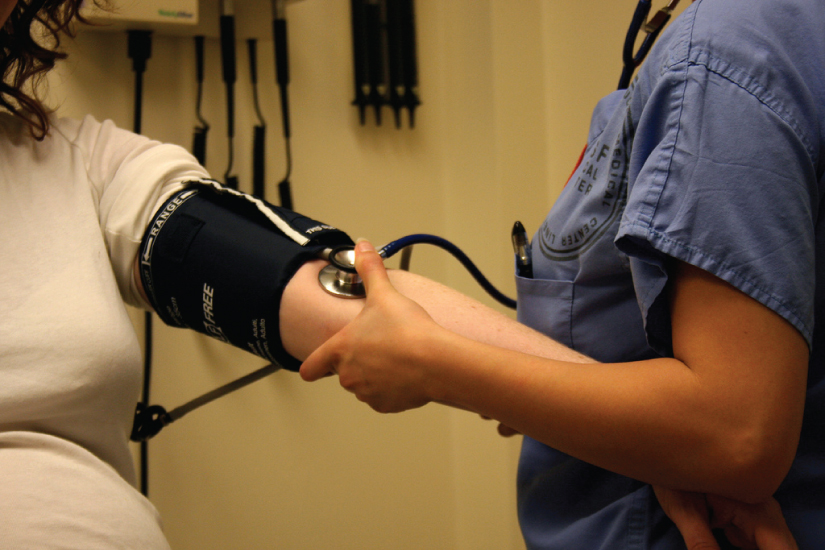
According to the American Heart Association, blood pressure is a measure of “the force of your blood pushing against the walls of your blood vessels.” How high your blood pressure is depends on how wide your blood vessels are and how fast your heart pumps blood through them.
If your blood vessels get more narrow, then your blood pressure goes up. Your blood pressure also rises any time your heart pumps harder, pushing more blood through your vessels at a time.
Your blood pressure at any given moment depends on a variety of factors, including your mood and activity level. For example, your blood vessels constrict when you exercise or get excited, which causes your blood pressure to rise.
This kind of blood pressure change is triggered by chemical signals in your body and it is known as vasoconstriction. It happens when your body purposefully constricts your blood vessels, often as a way to help you get more oxygen when you exercise or experience stress.

Vasoconstriction is only temporary, however, and your blood pressure returns back to a normal, baseline level after the chemical signal subsides. It is normal for your blood pressure to fluctuate throughout the day in this manner, but it is dangerous for your blood pressure to stay elevated for too long.
Chronic high blood pressure, also known as hypertension, happens when your blood pressure stays high long-term. This can happen via vasoconstriction, in the case of chronic stress or stimulant use, but it is often the result of a different type of blood vessel constriction that happens when your arteries get damaged, inflamed, or clogged up.
The main reason chronic high blood pressure is bad for you is that it puts extra pressure on your heart and blood vessels. Chronic hypertension forces your heart to work overtime, all the time, in order to keep your blood circulating efficiently.
One of the most common causes (and complications) of chronic high blood pressure is atherosclerosis, a condition that develops when plaque builds up on the insides of your arteries. This plaque clogs up your blood vessels, restricting the amount of space that your blood can flow through.
When this happens, your heart has to pump harder all the time in order to force blood through the narrowed spaces in your arteries. As your heart struggles to overcome the pressure in your blood vessels, it experiences continuous back-pressure. This eventually damages your heart's ability to pump and can lead to more serious health conditions.
The Hose Analogy For Understanding Blood Pressure

To help you understand how this works, think about how water pressure works in a hose. The pressure of the water that comes out of the hose is affected by both the speed of the water and the size of the hose's opening, just like your blood pressure is affected by how fast your heart pumps and how wide your arteries are.
For example, when you turn up the spigot on the hose to increase the flow of water, this causes the pressure of the water coming out of the hose to go up. This is similar to how your blood pressure goes up when your heart pumps faster.
Now think about what happens if the inside of the hose got clogged up with grime, or if you put your finger on the end of the hose to block part of the opening. This would also increase the water pressure, because the same amount of water is being forced through a narrower opening. This is just like how your blood pressure increases when when your arteries get narrowed, whether it happens through constriction or atherosclerosis.
How COPD Affects Your Blood Pressure
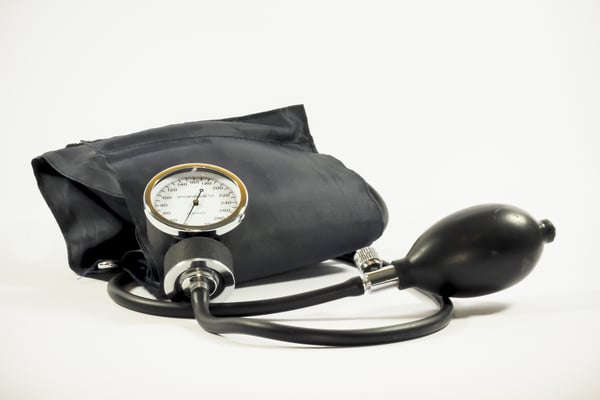
Because the heart and lungs are designed to work together, the effects of COPD on the lungs naturally affects your heart and the rest of you cardiovascular system. In fact, some COPD experts are beginning to think that COPD's affects on the heart are just as serious as the damage it does to the lungs.
In fact, there isn't just one, but many different mechanisms through which COPD raises your blood pressure. Let's look at each of these mechanisms to better understand how COPD affects your heart.
Low Blood Oxygen
One of the main ways that COPD affects your heart is by restricting your oxygen. Because the lungs are damaged, they often can't absorb enough oxygen to keep your blood oxygen levels high.
Having too little oxygen in your blood is known as hypoxemia, and it makes it difficult for your heart to ensure that enough oxygen makes it to all the different parts of your body that need it. When this happens, your body has to compensate in a variety of ways to keep as much oxygen circulating as possible.
One of the ways your body compensates for low blood oxygen levels is by pumping faster to push more blood through your body at a time. This increases your blood pressure, but has the advantage of circulating oxygen more quickly through your system.
This faster blood flow allows your body to better keep up with its oxygen needs, reducing the effects of hypoxemia. However, this causes your blood pressure to increase any time your oxygen needs increase, even during light activity.
It also makes your blood pressure rise any time your lung function decreases, such as during a COPD flare-up or exacerbation. As your COPD progresses and you experience hypoxemia more often, it can cause chronic hypertension and damage your heart and lungs.
Thicker Blood
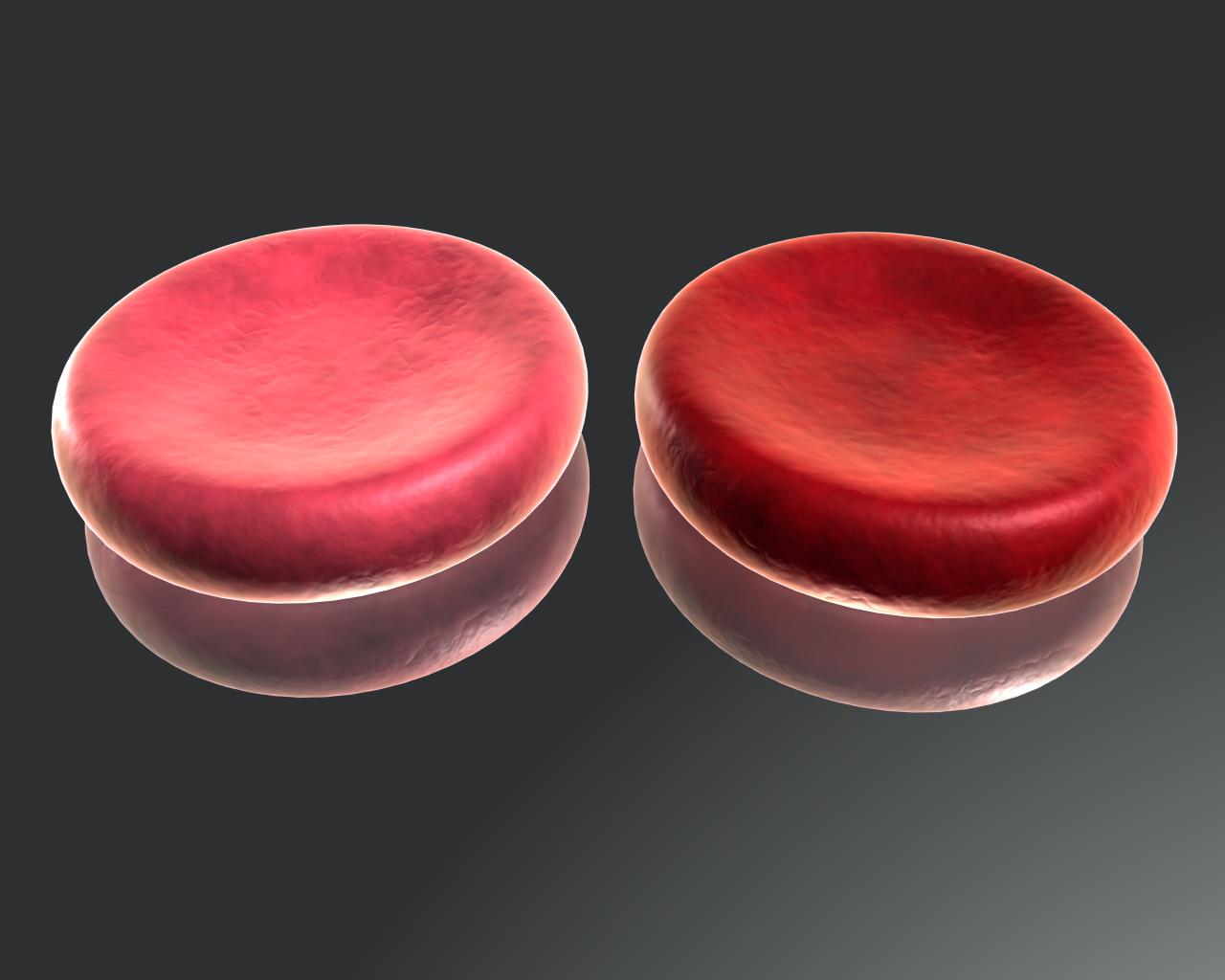
Increasing your red blood cell count is another way that your body compensates for low blood oxygen levels caused by COPD. It does this in the hope that having more red blood cells will allow your blood to absorb more oxygen from your lungs.
However, more red blood cells makes your blood more thick and viscous, which makes it harder for your heart to push it through your vessels. This increases your blood pressure and forces your heart to pump more forcefully, which significantly increases the amount of back-pressure on your heart.
Inflammation

COPD is known as an inflammatory disease because COPD patients consistently show elevated levels of inflammation throughout their bodies. This inflammation is well-known for damaging the lungs, but it can damage your heart and blood vessels, too.
Studies investigating the causes of high blood pressure consistently find that inflammation and hypertension are closely linked. Experts believe that inflammation in your blood vessels causes them to constrict and inhibits their ability to dilate.
Over time, the inflammation can even damage the insides of your arteries, making it easier for plaque to form and leading to atherosclerosis. Researchers have long connected COPD-related inflammation to patients' increased risk of high blood pressure, heart disease, and cardiac-related deaths.
Smoking

As we mentioned earlier, smoking is a major cause of high blood pressure and atherosclerosis. The fact that many COPD patients have a shared history of smoking is a major contributor to high blood pressure in people with COPD.
While researchers aren't exactly sure how it happens, the evidence is clear that smoking increases your blood pressure and damages your arteries. There is also a strong link between smoking and more serious cardiovascular problems like heart attacks and stroke.
The Symptoms of High Blood Pressure

High blood pressure does not usually cause any major symptoms, at least until it becomes very severe. Symptoms usually begin to show up once high blood pressure has progressed to a more serious condition like coronary artery disease (a more severe form of atherosclerosis).
Those who do experience symptoms of high blood pressure usually only notice mild symptoms like headaches and minor shortness of breath. If you suffer from COPD, these symptoms are easily obscured by the more severe symptoms of the disease.
Once high blood pressure has progressed to more serious cardiovascular disease, additional symptoms may appear. Unfortunately, the symptoms often don't become significant enough to notice until after your heart and blood vessels have sustained serious damage.
However, it is helpful to know what symptoms of high blood pressure and cardiovascular disease that you can look out for. The main early signs are headaches, shortness of breath, and feeling lightheaded or dizzy.
Here are some more signs and symptoms of high blood pressure and cardiovascular disease:
- Shortness of breath (especially while at rest)
- Headaches
- Dizziness and lightheadedness
- Fainting
- Chest pain, tightness, or discomfort
- Fatigue
- Nausea
- Irregular heartbeat
- Weakness, numbness, pain, or swelling in your extremities (hands and feet)
If you experience any of these symptoms, you should see your doctor right away. The sooner you get diagnosed for your heart problem, the sooner you can get proper treatment and take steps to prevent it from progressing into a more serious disease.
The Dangers of High Blood Pressure
What makes hypertension dangerous is the fact that it subjects the walls of your heart and blood vessels to extra pressure that can cause permanent damage. Over time, hypertension can weaken both your arteries and your heart, leading to serious heart problems and other complications.
This is particularly dangerous for COPD patients, who are especially prone to cardiovascular problems and heart disease. Additionally, COPD symptoms like inflammation and low blood oxygen levels can worsen high blood pressure and accelerate the rate at which it get worse.
Here are some of the major problems and complications that high blood pressure can cause:
- Heart disease (also known as coronary artery disease)
- Heart attack
- Heart failure
- Stroke
- Metabolic syndrome
- Problems with memory and cognition
- Kidney damage
- Vision loss
- Dementia
Some of these problems are more likely to affect people with COPD than others. Here is a closer look at some of the most common complications and health conditions that hypertension causes in people with COPD.
Atherosclerosis, Coronary Artery Disease, and Left-Sided Heart Failure

No mater the cause of your high blood pressure, hypertension increases your risk for atherosclerosis. The pressure of your blood against the inside of your blood vessels causes tiny tears and inflammation, which provide perfect spots for plaque to stick to your artery walls.
Since most COPD patients already have a history of smoking, their blood vessels are already more prone to atherosclerosis. This makes high blood pressure even more likely to cause more severe cardiovascular problems for people with COPD.
Over time, atherosclerosis causes your arteries to narrow and harden, causing a more severe form of atheroscelrosis known as heart disease (or coronary artery disease). As the blockages become even more severe, it causes the left side of your heart to enlarge.
Heart enlargement is one of the most dangerous effects of high blood pressure, and it causes your heart muscle to weaken over time. It happens when the pressure of the blood in your arteries gets so high that it creates a significant amount of back-pressure in your heart whenever it tries to pump.
This pressure causes blood to back up in your pumping chamber, which causes it to both pump faster and expand. While this allows the chamber to better handle the increased amount of blood, it also weakens the muscles in the walls of your heart, which eventually leads to heart failure.
Heart failure happens when your heart becomes so weak that it can no longer pump blood through your body effectively, causing your blood oxygen levels to fall dangerously low.
Heart disease, which is the root of heart failure, is also the cause of most heart attacks. And because fatal heart attacks are a major cause of death for people with COPD, it's important for patients to take their blood pressure, atherosclerosis, and other cardiovascular problems seriously.
Worsened Respiratory Symptoms
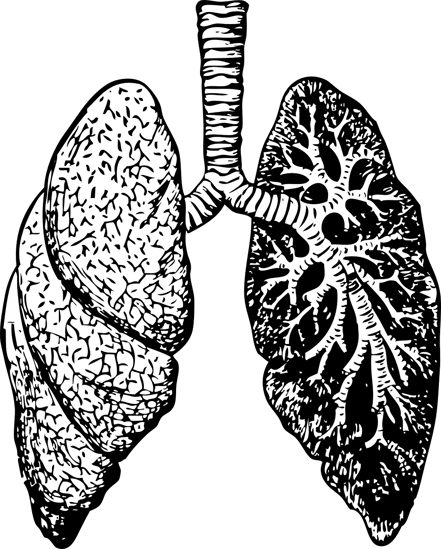
The symptoms of high blood pressure and other cardiovascular problems that result from high blood pressure often overlap with the symptoms of COPD. This means that high blood pressure and atherosclerosis can make your COPD symptoms worse.
High blood pressure also puts extra strain on your lungs by forcing them to work harder to keep up with the increased bloodflow. This causes you to breathe faster and get breathless more quickly, especially when you're not at rest.
Because of this, high blood pressure can make it both more difficult to breathe and more difficult to exercise. This makes living an active lifestyle difficult, which an end up making your COPD even worse.
The symptoms of high blood pressure will only get worse as it develops into more serious conditions like atherosclerosis and coronary artery disease. On the flip side, the better you take care of your heart and keep your blood pressure under control, the better you will be able to breathe and manage your COPD.
Pulmonary Hypertension and Right-Sided Heart Failure
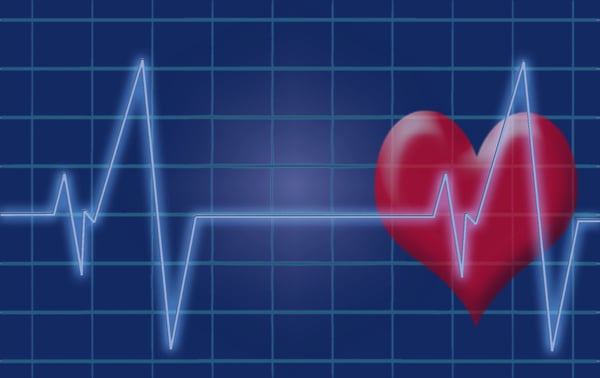
COPD is a major risk factor for right-sided heart failure, which happens for a completely different reason than left-sided heart failure. While left-sided heart failure is usually caused by high blood pressure and narrowed blood vessels throughout your body, right-sided heart failure is caused by narrowed blood vessels in your lungs as a direct result of COPD.
High blood pressure in the lungs is known as pulmonary hypertension, and it's a rare condition that affects COPD patients. It happens when your body restricts blood flow through certain parts of your lungs in an attempt to route bloodflow around the most damaged lung tissues.
This causes the right side of your heart, which is responsible for pumping blood into your lungs, to have to work extra hard to overcome the high pulmonary blood pressure. As it strains to push blood through the narrowed arteries in your lungs, blood backs up in the chamber and causes it to enlarge.
Over time, this enlarging weakens the muscle in the right chamber of the heart until it becomes too weak to pump blood through the lungs effectively. This causes right-sided heart failure, which makes it even harder for your lungs to keep up with your body's oxygen needs, and can cause your blood oxygen to drop to very dangerous levels.
Understanding the Threat
COPD is a disease of the circulatory system just as it is a disease of the lungs. If you want to stay as healthy as possible with COPD, you have to make your heart health a priority.
Unfortunately, heart problems caused by COPD are little-known and rarely receive the attention they deserve outside of the medical community. Even at the doctor's office, many patients fail to get the information they need to adequately understand the cardiovascular effects of the disease.
Because so many of the symptoms of high blood pressure, and especially heart failure, overlap with symptoms of COPD, preventing and treating high blood pressure is important for keeping COPD symptoms at bay. In fact, experts believe that breathing problems experienced by COPD patients could be caused, at least in part, by high blood pressure and atherosclerosis.
Unfortunately, too many doctors don't look closely enough at their patients' cardiovascular health when diagnosing COPD. As a result, too many patients with both COPD and underlying heart conditions don't get adequate treatment.
Research shows that an alarmingly large percentage of patients have undiagnosed cardiovascular problems in addition to COPD. Research also shows that COPD patients with high blood pressure have a significantly higher chance of death.
Because of this, it's imperative for all COPD patients to understand the dangers of hypertension and how it can affect their disease. This can be achieved through better blood pressure monitoring, better treatment, and educations about how COPD contributes to high blood pressure.
Preventing High Blood Pressure When You Have COPD
One thing that's important to know is that most causes of high blood pressure are very preventable. That's good news, because that means that you can take control over the health of your heart and prevent high blood pressure by making healthy decisions.
However, it is not always easy to commit to the kinds of lifestyle changes that are necessary to keep your heart and blood vessels healthy. But the time, effort, and dedication it takes is worth the difference it will make to your health and your quality of life.
By and far, the best thing you can do to prevent high blood pressure when you have COPD is to quit smoking. Despite what some people believe, it's never too late to quit smoking, and quitting will always have a positive effect on your health, even if you already have COPD.

In fact, if you still smoke, quitting smoking is one of the most important things you can do to treat your COPD. It will not only help you feel better both physically and mentally, but it could even slow down the progression of your COPD.
Eating a healthy, balanced diet and getting plenty of exercise is also extremely important for keeping your cardiovascular system healthy and strong. Eating lots of fruits and vegetables and living an active lifestyle is one of the most effective ways to prevent high blood pressure and atherosclerosis.
There are many other things you can do to reduce your risk of high blood pressure. Here are some more practical tips you can use to prevent hypertension and reduce your risk for other cardiovascular complications related to COPD.
How to Prevent High Blood Pressure When You Have COPD:
- Don't miss any doctor's appointments and make sure to ask your doctor about your blood pressure.
- If you are taking blood pressure medication, always take your medicine as directed and don't skip any doses.
- Maintain a healthy BMI; excess weight is hard on your heart and increases your blood pressure, and it can also make it more difficult to breathe and exercise.
- Eat a healthy, balanced diet that's low in cholesterol and processed foods.
- Avoid foods that are high in salt; it can hide in unlikely foods, so always check the nutrition labels.
- Avoid eating too many processed meats like ham, sausage, and deli meats.
- Always take your COPD medications on time and as directed; if you keep your COPD symptoms under control, you will put less strain on your heart.
- Quit smoking to reduce your risk of heart disease.
- Get plenty of exercise; walking, jogging, and biking are great heart-healthy activities to start with.
What we've mentioned here is only a brief look at all of things you can do to keep your heart healthy with COPD. To learn more, take a look at our comprehensive guide on How to Prevent Heart Problems with COPD.
Conclusion
It's impossible to have a full understanding of COPD without understanding how it affects the heart. It's also important to realize that high blood pressure and heart disease may be at least partially responsible for many of the symptoms of COPD.
Keeping your blood pressure under control is a vital part of preserving your health as you age and your COPD progresses. It is also important for managing COPD symptoms and preventing many other cardiovascular complications, including heart attack and stroke.
Your heart and lungs are some of the most vital organs you have, and they are inextricably linked to your quality of life. That's why it's so important to make heart-healthy decisions and enact lifestyle changes that will strengthen, instead of weaken, your heart.


.png)





